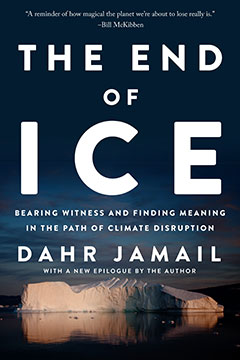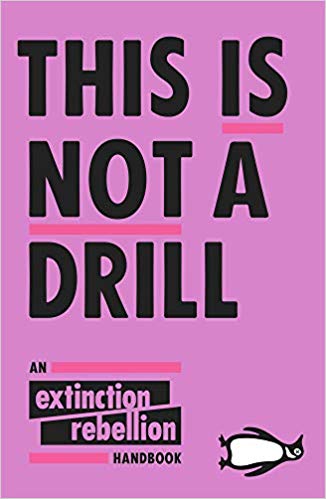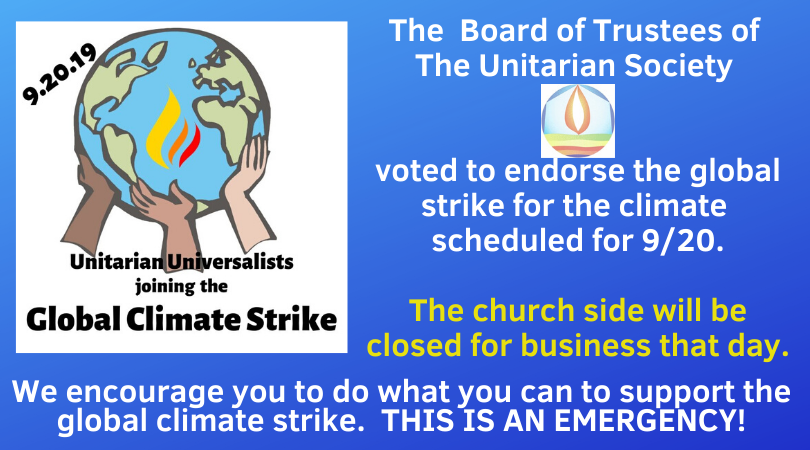September 15, 2019
The Unitarian Society, East Brunswick, NJ
Reverend Karen G. Johnston
We refuse to bequeath a dying planet to future generations by failing to act now.
We act in peace, with ferocious love of these lands in our hearts.
We act on behalf of life.
Powerful words in the midst of a topic – in the midst of a REALITY – that is so heavy it is leaden beyond leaden, it is difficult to offer the proper invitation, sufficient space, for full consideration.
We refuse to bequeath a dying planet to future generations by failing to act now.
We act in peace, with ferocious love of these lands in our hearts.
We act on behalf of life.
Last month I preached of how we have shifted from climate change in the present tense to climate changed – past tense, the change already happening, damage already done and now beyond our prevention, to be sure, and beyond our fixing, but not yet – according to many – beyond our being able to minimize, not yet beyond the choice to lessen the suffering – to lessen our suffering and the suffering of others, never the first without the other.

There are so many voices, some in resonance with each other, some in contradiction – and these are just the science-based ones. David Wallace Wells who tells us that climate nihilism is just as much a delusion as climate denial. Jonathan Franzen, in this week’s New Yorker, telling us that it’s beyond time to stop pretending. We can read Dahr Jamail’s The End of Ice and weep lavishly for all that has been lost, is being lost.
We can listen to visionary feminist fiction writers of the 1990s who knew what was in store.
Starhawk’s Fifth Sacred Thing and Octavia Butler’s Parable trilogy (with its two books). A quarter of a century ago these wise women were listening to the Earth, to activists and healers, could perceive the path we have been on, are on. In these offerings of fiction, there is wisdom of how we might realistically move forward in a climate constricted world.
Currently, there is Jem Bendell, a British academic, who speaks of “an uneven ending of our normal modes of sustenance, security, pleasure, identity, meaning and hope.”[1] Or, in other words, collapse. His approach to this fraught topic is that a failure to normalize conversations about collapse, will cause us, and the planet, even more harm.
We refuse to bequeath a dying planet to future generations by failing to act now.
We act in peace, with ferocious love of these lands in our hearts.
We act on behalf of life.
~~~
Jem is just one in the multi-voice environmental movement that is Extinction Rebellion. Called XR for short, its hourglass symbol on the back of my robe today, it is a global movement formed less than a year ago in the United Kingdom. Non-violent, artistically creative, and intentionally disruptive, Extinction Rebellion gives shape to the rebellious instinct against the existential threat that we call climate crisis.
Extinction Rebellion’s primary demands are fundamentally intersectional. They recognize that we cannot end dominion over nature without attending to all forms of dominion, of cultural oppression. The struggle for climate justice is “the struggle for racial, gender, sexual, and economic equality.”[1]
Thanks to XR, the UK declared carbon neutrality by 2050 — and XR continues to push for even sooner, for truly, 2050 is far too late. XR presses for municipalities all over the world – nearly a thousand so far – to declare climate emergencies. Just a week or two ago, they pressured the New York Times to recognize the hypocrisy of so-called objectively reporting on climate change and sponsoring a major conference of the oil industry conference. Due to XR’s, and others’ actions, they scrapped their sponsorship!

Three months ago, XR published a handbook called, This Is Not a Drill, from which this sermon takes its title. In it, there is a mini-primer on Donut Economics by “Renegade Economist” Kate Raworth, advocating for an economy that makes us thrive, whether or not it grows, rather than the kind we currently have, which is an economy that grows, whether or not it makes us thrive. One chapter is a deeply disturbing window into how the ultra-rich are preparing for collapse (FYI: it does not include you and me). There is a recipe for how to hold successful non-violent, civilly-disobedient actions, including how to feed people. And it includes XR’s declaration of emergency, which ends with these three lines:
We refuse to bequeath a dying planet to future generations by failing to act now.
We act in peace, with ferocious love of these lands in our hearts.
We act on behalf of life.
XR is intentionally non-partisan. And though some faith leaders are associated with it, it is not a faith-based movement. Even so, I wonder if you hear, like my nephew did, the echoes of the ancient text of Deuteronomy from Hebrew Scriptures:
“Now choose life, so that you and your children may live.”
What I find resonant — theologically, spiritually — with XR is part of our Universalist heritage: there is no individual salvation. All salvation is universal. All liberation is collective. And thusly must we bring it about.
Extinction Rebellion’s message and methods are dramatic because the reality we are facing is existential. Last October’s IPCC report informed the world we had less than 12 years to…to what? Not to prevent climate change – it’s too late for that. Eleven years to make changes now so that we might create a path to net zero CO2 emissions by mid-century,[2] which is one goal in averting total disaster. That eleven-year forecast is conservative. So conservative, that it does not serve us in fully understanding the emergency in our midst: time and time again, the timelines put out by the IPCC have shown themselves to be wild under-estimates.
~~~
This is perhaps why Extinction Rebellion, and other climate movements have gone global so rapidly, resonating so deeply, captivating the imaginations of so many, including people who had never considered themselves activists. XR has emerged as part of the same Zeitgeist as the Sunrise Movement in this country. And as the climate strike movement that has blossomed out of the actions of now 16-year-old Swedish Greta Thunberg (you might remember her from our Earth Day service called, “I Want You to Panic”). Last fall, Greta stopped attending school on Fridays, choosing instead to sit outside her nation’s parliament building to demand that the government respond in a way that is proportionate to the emergency at hand. This year, she has taken a leave of absence to focus on the climate crisis. She traveled to the U.S. on a solar-powered ship, not wanting to fly, given the carbon footprint. She is here to do many things, including attend to the United Nations climate talks beginning a week from tomorrow.
Days before that meeting is the global strike for the climate on September 20. THIS FRIDAY. Initiated by youth climate activists, the call is for ALL to participate – and it is just five days away. The global climate strike is supported by many organizations world-wide, including the Unitarian Universalist Association, including the Board of this congregation.
Including the Central Jersey Climate Coalition, a group begun by students, faculty, and staff at Rutgers, responding to the call to strike. We are blessed that some of these pragmatic, diligent, insistent organizers are here with us this morning. They’ll have some time after my sermon to speak invite you to take part in the rally. I’m hoping that they will stay for at least some of coffee hour to share with you more of their passion on this topic.
The call to strike is wide – whatever level of participation your circumstance allows (and maybe stretching beyond your comfort zone). Perhaps you can still put in for a day off from work this Friday. If you own a business, you shut it down for the day (I know of at least one TUS congregant who is considering this – pretty impressive, if you ask me). Or if you can leave work early, you could join one of the 10 rallies statewide.
If you are in this area, you can go to the rally at Rutgers at 2:30, with a march to Representative Frank Pallone’s office, demanding that he call hearings on the Green New Deal, since he is the chair of the House Energy and Commerce Committee.
Here’s what I know: If we continue with our business as usual, fed by our own versions of denial and wishful thinking – that is what our elected officials will do too.

On Friday, I will not be here (none of our church staff will be; as an employer, on the church side we are honoring the strike). Our emails will be silent as well. (Of course, if you have a pastoral emergency, still call or text me!) In the afternoon, I will be at the Rutgers rally. I’m hoping to see some of you there, too. Or you can start at the other local rally at the Reformed Church in Highland Park at 3pm. Both rallies are coordinated and will join together on our way to Representative Pallone’s office.
In the morning on Friday, the President of our Unitarian Universalist Association, Reverend Susan Frederick-Gray, is speaking at Community Church in New York City, as is the new Activist-in-Chief of 350.org – May Boeve. I’ve been wondering about whether I can squeeze that into what will be a busy, busy day. If any of you want to make a congregational trip of it, please let me know.
~~~
Before we hear from some Rutgers students, I want to bring your attention to the ClimateSpirit gathering happening this evening. Its goal is to create over time a pocket of deep community through connecting, singing, sharing, and eating, providing a resilient space to process climate grief, in order to make room in your psyche, soul, or spirit to do whatever it is that is yours to do. I’m thankful to TUS member Stephanie Sasso, who will be leading the singing. It’s open to ages high school and older. It starts at 5:30. Each of you is invited. All of you are welcome. As are your friends, your neighbors, the wider community. Word of it has gone far and wide. I can’t tell if we will have five people or fifty.
~~~
It is not easy to make room in our psyches, in our heartminds, for the reality of climate chaos, no matter the scale. If we did — if we do –it means that it is not just other people who must stop “business as usual.” It is we who must do this. And must do it now, for time is ever so short.
Let us, in
whatever ways possible, rise up to the call, not only of this strike, but of
this larger moment. Let us raise up our
personal sense of connection and our communal sense of hope.
Let us refuse to bequeath a dying planet to future generations by failing to act now.
Let us act in peace, with ferocious love of these lands in our hearts.
Let us affirm: we act on behalf of life.
Amen. And may it be so.
I’d like to welcome Rutgers folks from the Central Jersey
Climate Coalition to come forward and share a few words with the
congregation. While they are speaking,
baskets of climate strike buttons are being passed around. Please take one – two if you will give the
other away – to show your support for this global effort.
[1] Yamin, Farhana. This Is Not a Drill.
[1] Jem Bendell, Doom & Bloom, This is Not a Drill
[2] https://insideclimatenews.org/news/27082019/12-years-climate-change-explained-ipcc-science-solutions